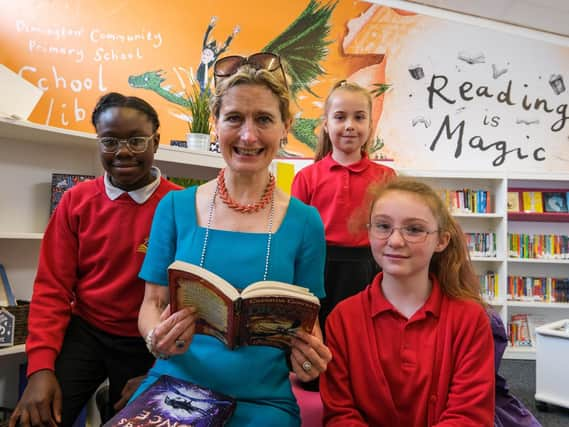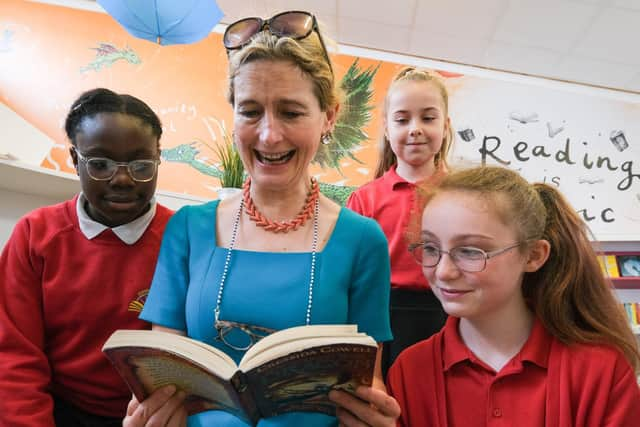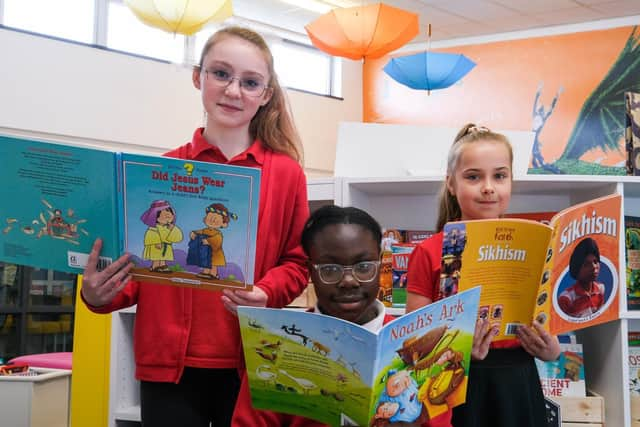Children's Laureate Cressida Cowell: 'Levelling up' is impossible without investing in Yorkshire's school libraries


“As a children’s author, you probably visit more schools than an Ofsted inspector,” says Cressida Cowell as she stands inside the gleaming new library belonging to Dinnington Community Primary School in South Yorkshire “Children are so smart and intelligent wherever you go but you quickly become very aware of the differences in provision of the books available and whether they are able to read for the joy of it.”
Cowell, who has sold more than 11 million books across the world and has seen her How to Train Your Dragon series turned into a set of Hollywood films and a TV show, has arrived in Yorkshire on a simple but ambitious mission in her role as Waterstones Children’s Laureate – to urge the Government to invest £100m a year in the nation’s school libraries.
Advertisement
Hide AdAdvertisement
Hide AdDinnington Community Primary School is one of six schools across the country that have been selected for a pilot scheme organised by charity BookTrust to highlight the transformative difference a well-stocked school library can make to the academic achievements and life chances of pupils.


With one in eight schools having no library at all and others that do often relying on limited, outdated and simply dog-eared collections of books, Cowell’s Life-changing Libraries campaign aims to transform provision.
In 2019, the Great Schools Libraries report, which involved collecting findings from 1,750 schools, found those with a higher proportion of children eligible for free school meals are over twice as likely not to have a designated library space onsite. Of the primary schools that did have a library, only about one-third had a dedicated budget to support it – compared to 83 per cent of private schools.
Cowell says investing properly in school libraries is essential if the Government wants to deliver on its much-vaunted ‘levelling up’ agenda.
Advertisement
Hide AdAdvertisement
Hide Ad“I just think it is impossible to level up without giving children the opportunity to read for the joy of it. If a parent’s child can’t afford books and there isn’t a library in the primary school, it is an awful phrase but they can’t compete.


“If you are serious about levelling up, you have to do something like this. It sounds a lot but £100m is not really a large amount.”
Cowell was visiting Dinnington as part of a whistle-stop tour of the six pilot schools, all of which have at least 25 per cent of pupils eligible for free school meals, selected for the project. In Dinnington’s case, a previously empty room has been transformed into a stunning new library with around 1,000 new children’s books.
The project intends to spotlight the four pillars of a successful ‘gold standard’ school library – space, book provision, expertise, and whole-school and parent involvement, with schools supported in developing a ‘reading for pleasure’ culture.
Advertisement
Hide AdAdvertisement
Hide AdWith their library open and Dinnington’s pupils able to enjoy the new space, the project will monitor the impact on their engagement, attitudes and reading behaviour across 12 months, collecting qualitative stories and case studies and hopefully make the case for increased Government investment.
Dinnington Community Primary School was rated inadequate in its last Ofsted inspection in 2019, with the report noting concerns about the teaching of reading. The report said: “Lower-ability pupils find it difficult to think of a book they enjoy. Many pupils do not take books home regularly to share with their families and they do not have enough opportunities to read aloud to an adult in school.”
Sarah Reason, who has become headteacher since that report, says the new library is central to the school’s improvement plans.
“Reading is the key to the rest of curriculum,” she says. “Once they can read, the whole of the curriculum is open to them. Having this library is going to be absolutely massive for us, lots of our pupils don’t have access to these books at home. There is something for everybody in here - you can create a reader in this library really.”
Advertisement
Hide AdAdvertisement
Hide AdShe says budgetary constraints had previously made it impossible for the school to afford to create its own dedicated library space itself.
“Libraries require upkeep and that is why additional funding is important. You want to keep the quality of the stock high,” she explains. “We have no money in the budget at all – most of our budget gets taken up by staffing and when you have pupils with complex needs you need additional staff. That doesn’t leave much room for things like this. We wouldn’t have been able to do this on our own at all.”
Cowell started writing her own stories while in primary school age and says going to public libraries and having supportive teachers was vital to developing her love of reading and setting her on the path to her successful literary career.
“I went to the library once a week – that was very common in the 1970s and people generally bought books less,” she says. “I started writing my own stories and I had a lovely teacher called Miss Mellows who just let me write without the pressure of it being properly marked. That really led me to discover the joy of writing.”
Advertisement
Hide AdAdvertisement
Hide AdIn April, Cowell penned an open letter to the Government asking for the additional £100m investment with co-signatories including many of the nation’s most notable children’s authors such as Sir Quentin Blake, Michael Rosen, Julia Donaldson, Dame Jacqueline Wilson and Sir Michael Morpurgo.
The letter highlighted the wider array of research that has linked reading for pleasure to higher achievements in education and later life.
“According to the OECD, reading for pleasure is a bigger indicator of a child’s educational success than their parent’s socio-economic status,” it stated. “Ofsted has recognised the vital role that reading for pleasure plays in improving literacy levels. School libraries are an essential tool: in 2019, the National Literacy Trust and Nottingham Trent University found that children using their school library were more likely to read for pleasure and had better reading and writing attitudes – this difference was especially marked for those eligible for free school meals.”
Cowell says she is awaiting the Government’s response and highlights the £100m the campaign is asking for is less than one-third of the £320m earmarked for PE and sports in primary schools which has been widely heralded as a success. The Department for Education’s current position is that schools have to decide individually how to provide and maintain a library service, with the national curriculum requiring teachers to encourage pupils to read for information and pleasure.
Advertisement
Hide AdAdvertisement
Hide AdStrikingly, while library provision is a statutory requirement for prisons, that is not currently the case for schools.
Cowell says: “I’m very pleased that prisons do have libraries but primary schools should too. But it is no good making it statutory without getting the funding. It is not a high amount when you think of the benefits it brings.”
How 'reading for pleasure culture' improved results
Among the other people involved in the project is educational coordinator Catherine Millar.
The former assistant head at a school in Richmond explains that after attending a conference about the importance of reading for pleasure, she encouraged more reading among her pupils - with dramatic results.
Advertisement
Hide AdAdvertisement
Hide Ad“Over two terms, 100 per cent of my class made expected progress for the year and 80 per cent of the children made better than expected progress in different subjects.”
She is now working with the BookTrust and the pilot schools to build a ‘reading for pleasure’ culture to go alongside the new libraries. It involves encouraging staff to share success stories with each other and asking older children to be reading ambassadors.
Support The Yorkshire Post and become a subscriber today. Your subscription will help us to continue to bring quality news to the people of Yorkshire. In return, you'll see fewer ads on site, get free access to our app and receive exclusive members-only offers. Click here to subscribe.